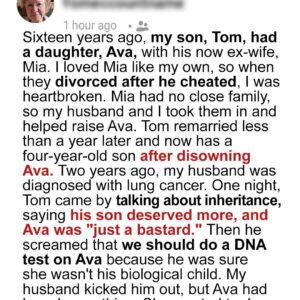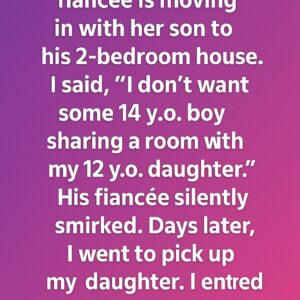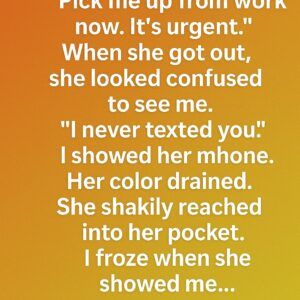When her husband passed away, Helen Parker felt as though the world had gone quiet. For nearly fifty years, she and Peter had shared everything—morning coffee
When her husband passed away, Helen Parker felt as though the world had gone quiet. For nearly fifty years, she and Peter had shared everything—morning coffee on their porch, long drives through the countryside, quiet evenings spent in the garden he loved so dearly. But after his sudden death, the silence in the house was deafening.
Her children called often, her neighbors checked in from time to time, but nothing could fill the void Peter had left. The days felt endless, and the nights even longer. Then, about two months after the funeral, something unusual happened.
One chilly March morning, Helen opened her front door to fetch the newspaper—and froze. There, sitting neatly on the top step, was a small bouquet of yellow roses, tied with a simple white ribbon.
Yellow roses had always been her favorite. They were the same flowers Peter used to bring her every Sunday after church, no matter how tight their budget was.
At first, Helen assumed one of her children had left them. Her eldest daughter, Laura, often stopped by to check on her. But when Helen called to thank her, Laura was genuinely puzzled.
“Mom, I didn’t send you flowers,” Laura said. “Maybe Aunt May did?”
But her sister hadn’t either. Neither had any of Helen’s grandchildren.
So who could it be?
The next week, another bouquet appeared—fresh, bright, and perfectly arranged. No note, no card, just those cheerful yellow roses sitting quietly on her doorstep.
Helen began to expect them every Friday morning. Rain or shine, they were always there. Sometimes tied with ribbon, other times wrapped in brown paper.
At first, the mystery felt comforting. She liked to imagine Peter somehow finding a way to send them, as if he was still looking after her from beyond. But after several weeks, curiosity—and a little unease—began to grow.
When Laura came over for lunch one weekend, she found her mother standing at the kitchen window, staring thoughtfully at the vase of roses.
“Whoever’s sending them must really care about you,” Laura said.
“Yes, but who?” Helen murmured. “No one ever sees them being delivered. It’s the strangest thing. I don’t even hear a car.”
Laura frowned. “Mom, this has been going on for months. Maybe we should find out who’s doing it. It could be harmless, but it could also be… I don’t know, strange.”
Helen waved her off, half-smiling. “You always worry too much. They’re just flowers.”
Still, Laura couldn’t shake the uneasy feeling. The next day, she called her brother David, who lived two towns over.
“She’s been getting flowers every single week, Dave. No note, no name, no delivery slip. Don’t you think that’s weird?”
David agreed. “I’ll bring over a camera. We’ll find out who’s behind it.”
The following Friday, David set up a small surveillance camera just above the front porch light—discreet enough that no one would notice it. Helen protested, but eventually relented.
“If it makes you two feel better, go ahead,” she said with a sigh. “But I’m sure it’s just some kind soul from church.”
That night, she went to bed early, thinking how Peter would have laughed at all this fuss. He’d probably tease her for being the neighborhood’s mystery lady.
Saturday morning, David stopped by to check the footage. He and Laura huddled around his laptop while Helen made tea.
Hours passed on the screen—empty porch, swaying tree branches, a stray cat wandering by. And then, just after dawn, a figure appeared.
It was a teenage boy, no more than sixteen or seventeen. He wore a hoodie, his hands full of flowers. He looked around nervously, placed the bouquet on the doorstep, and hurried away down the street.
Helen peered over her children’s shoulders, startled.
“I don’t recognize him,” she said softly. “Do either of you?”
David shook his head. “No idea. Maybe a local kid?”
Laura frowned. “Why would a teenager bring flowers to an old woman he doesn’t know?”
No one had an answer.
The next morning, Laura went around the neighborhood, asking if anyone recognized the boy from the photo David printed from the video. Most people hadn’t seen him before, but Mrs. Crawford, who lived three doors down, thought she might know.
“I’ve seen that boy hanging around the old bus stop near the high school,” she said. “Quiet kid. Keeps to himself. I think his name’s Mason or Miles, something like that.”
Armed with that small clue, David stopped by the high school the next day to speak with the principal, an old friend of his. After a few minutes of looking through photos, they found him.
His name was Miles Thompson, seventeen years old.
“Nice boy,” the principal said. “Keeps to himself, but works part-time after school. Had a rough few years—his father passed away recently.”
David thanked him and left, the mystery only deepening.
That Friday, when the next bouquet arrived, Helen decided she wanted to talk to the boy. She sat by the window from before dawn, waiting. Sure enough, around 6:15 a.m., she saw him approach, clutching another bunch of yellow roses.
She quietly opened the door before he could turn away.
“Oh!” Miles startled, nearly dropping the flowers.
“I’m sorry to frighten you,” Helen said gently. “You’re the one who’s been leaving these, aren’t you?”
The boy hesitated, eyes darting toward the street. Then he nodded.
“Yes, ma’am.”
Helen smiled softly. “They’re beautiful. But why me?”
Miles looked down. “Because of Mr. Parker.”
Helen’s heart stuttered. “You knew my husband?”
Miles nodded. “I used to see him at the park. He’d sit by the fountain and feed the birds. One day, I was having a bad time—skipped school, didn’t want to go home—and he sat down next to me. He didn’t say much, just handed me a sandwich and said, ‘You look like you could use this more than the pigeons.’”
Helen smiled faintly, tears stinging her eyes. That was so like Peter.
“He started talking to me after that,” Miles continued. “He told me about you and how much he loved you. He said yellow roses were your favorite. When I heard he passed away… I just wanted to do something. I saved up from my job at the grocery store and started leaving the flowers every week. I didn’t think you’d find out.”
For a long moment, Helen couldn’t speak.
She finally said, “That was very kind of you, dear. You’ve brought me so much comfort. Peter would be so touched to know you remembered him.”
Miles looked relieved. “I didn’t mean to scare you. I just wanted to make sure you weren’t alone.”
When Laura and David heard the story later that day, both were stunned—and deeply moved.
“So Dad was helping this kid, and now he’s helping you,” Laura murmured. “In a way, it’s like he’s still here.”
Helen nodded. “Kindness has a way of coming full circle.”
After that, Miles no longer left the flowers in secret. Instead, he began visiting Helen every Friday after school. They’d sit together in the garden, tending to Peter’s old rose bushes, sharing tea and conversation.
Helen learned that Miles’s mother worked long hours to support him and his younger sister. His father had died of a heart attack two years earlier, leaving the family struggling.
“Peter used to say you can’t always fix the world,” Helen told him one afternoon, “but you can make someone’s corner of it a little brighter.”
Miles smiled. “I guess he made mine brighter. Now I want to do that for others, too.”
And he did.
Over the following months, Miles became almost like a grandson to Helen. He helped her around the house, fixed things Peter used to handle, and even brought her groceries when it rained.
At Thanksgiving, Helen invited him and his mother, Renee, to dinner. It was the first time in years that Helen’s table had been so full—laughter, clinking dishes, and the warmth of family everywhere.
Laura leaned over to her brother during dessert. “You know, Mom’s smiling again,” she whispered.
David nodded. “Yeah. Maybe Dad sent that boy to her.”
A year passed. The Friday flowers continued, though now Helen and Miles chose them together from the local florist.
Sometimes, they added daisies or tulips. But there were always yellow roses.
One afternoon, as they sat together pruning the bushes, Helen said quietly, “You know, I think Peter would’ve been proud of you.”
Miles looked down, smiling shyly. “He already gave me more than he knew.”
“How’s that?”
“He made me believe that small things matter,” Miles said. “That being kind is enough.”
Helen reached out and gently squeezed his hand. “That’s something the world could use more of.”
By the time Miles graduated, Helen had become an honorary grandmother to him and his sister. The Parkers and Thompsons spent holidays together, and the once-quiet house was again filled with laughter and life.
Every Friday morning, Helen still placed a vase of yellow roses by the front window—a quiet reminder of how a single act of kindness had bridged two lonely hearts.
And though Peter was gone, Helen no longer felt alone.
Because love, she realized, doesn’t end when a person leaves. Sometimes, it finds its way back—one bouquet at a time.





